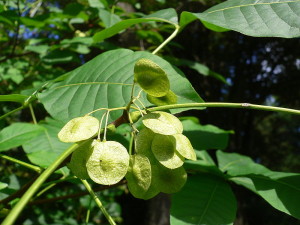Ptelea is a genus of flowering plants in the citrus family, Rutaceae. The name, of Greek derivation, is the classical name of the elm tree. Carl Linnaeus used that word for this genus because of the resemblance of its fruit to that of the elm. Members of the genus are commonly known as hoptrees.
Contents
Uses
German immigrants to Texas in the 19th century used its seeds in place of hops in the beer-making process. “Early settlers, desperate for a drink, substituted the fruits for true hops in beer-making, giving rise to the current common name.”
Benefits
The root-bark is anthelmintic, antibacterial, antiperiodic, stomachic and tonic. It has been mixed with other medicines in order to give added potency. It has a soothing influence on the mucous membranes and promotes the appetite, being tolerated when other tonics cannot be retained. It is also taken in the treatment of intermittent fevers such as malaria, heartburn, roundworms, pinworms and poor digestion. Externally it is applied to wounds. The roots are harvested in the autumn, the bark peeled off and dried for later use. The roots are a tonic, used in the treatment of asthmatic breathing, fevers, poor appetite etc. The leaves are said to be useful in the treatment of wounds and also in the destruction of intestinal worms.
Cautions
This species can cause photosensitization of the skin.
Interactions
We currently have no information for Interactions of Ptelea trifoliate.
Other names
Hop Tree
References
Source: Wikipedia, https://en.wikipedia.org/wiki/Ptelea_trifoliata
NaturalMedicinalHerbs, http://www.naturalmedicinalherbs.net/herbs/p/ptelea-trifoliata=hop-tree.php

